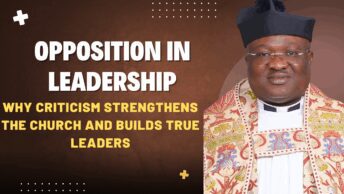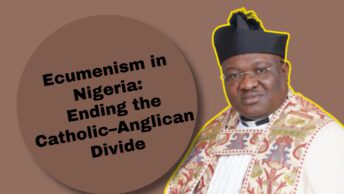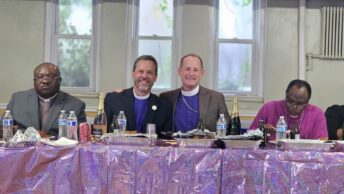By Ven. David Chimezie Nwanekpe,
Dip.Th, BA (Hons), B.Th (Hons), MA, M.Th, D.Th (Honoris Causa)
Introduction
The Anglican Church has historically maintained a balance between episcopal leadership, clerical ministry, and lay participation in governance. This structure is visible in every diocese, where the bishop provides oversight, the clergy serve as pastoral agents, and certain lay offices—particularly the Chancellor and the Registrar—safeguard the Church’s legal and administrative integrity. While these offices originated in the Church of England, they have been contextualized within the dioceses of Nigeria to suit cultural, legal, and constitutional realities. This article explores the relationship between bishop, clergy, and these lay legal officers, with special attention to the Nigerian context, and compares it with the English pattern.
The Bishop and the Clergy
The bishop remains the chief pastor, teacher, and overseer of the diocese. He ordains, licenses, and deploys clergy for mission and pastoral care. The clergy, in turn, serve under episcopal oversight, leading congregations in Word and Sacrament, teaching the faith, and shepherding the people of God.
This partnership is sacramental and pastoral, not merely administrative. The bishop embodies unity in the diocese, while the clergy embody presence at the grassroots. Together, they reflect the Anglican principle of shared ministry within ordered hierarchy.
The Office of the Chancellor
The Chancellor is the principal legal adviser to the bishop and the presiding judge of the diocesan ecclesiastical court. In the Church of England, this role is filled by a qualified lawyer—often a barrister or judge—appointed by the bishop, with jurisdiction over matters such as property, faculties, and discipline.
In dioceses in Nigeria, the Chancellor performs similar functions, but within a more complex legal environment where church law intersects with Nigerian civil law. The Chancellor provides legal guidance in issues of property ownership, trusteeship, succession, and constitutional interpretation. Unlike the clergy, the Chancellor is not ordained but offers professional legal expertise to ensure that the diocese operates with legitimacy and accountability.
The Office of the Registrar
The Registrar serves as the principal administrative and legal recording officer of the diocese. In England, the Registrar is responsible for preparing legal instruments, maintaining diocesan records, and ensuring compliance with ecclesiastical and charity law.
In dioceses in Nigeria, the Registrar fulfills comparable duties. However, three features are noteworthy:
- Appointment and tenure: The Registrar is appointed directly by the diocesan bishop and serves at the bishop’s discretion.
- Status: The Registrar is an honorary officer, not a salaried staff of the diocesan secretariat, and functions out of professional duty and service to the Church.
- Responsibilities: The Registrar drafts instruments of appointment, keeps synodical and legal records, ensures compliance with the Constitution of the Church of Nigeria, and safeguards the diocese’s corporate identity before the state.
This position, though often unseen, ensures institutional credibility, transparency, and compliance.
The Bishop, the Clergy, and the “LEGO” of Governance
The relationship between bishop, clergy, Chancellor, and Registrar can be compared to pieces of a LEGO structure: each piece is distinct but essential for the whole. The bishop provides oversight, the clergy provide pastoral care, the Chancellor offers legal judgment, and the Registrar secures records and compliance.
When these offices work in harmony, the diocese reflects the Pauline principle that all things “be done decently and in order” (1 Corinthians 14:40).
Comparison with the Church of England
The Nigerian adaptation of these offices reflects both continuity and change:
- Continuity: Like their English counterparts, Nigerian diocesan Chancellors and Registrars are appointed by the bishop, are usually professional lawyers, and serve to uphold ecclesiastical law.
- Change: In England, the Church of England functions as the established church with ecclesiastical courts integrated into state law. In Nigeria, dioceses operate within a pluralistic, voluntary religious framework, making the Chancellor and Registrar essential for legal recognition and protection of church property, corporate identity, and trusteeship.
Thus, while the offices remain structurally Anglican, their practical importance is heightened in the Nigerian context.
Constitutional Foundations
The Constitution of the Church of Nigeria (1979) provided the original framework for these offices, establishing the need for legal officers to support diocesan governance. The 1997 Constitution of the Church of Nigeria (still widely referenced today) codified the roles of Chancellor and Registrar more explicitly, designating them as part of the diocesan and national governance structure.
It affirms that the Registrar serves as custodian of legal instruments and records, while the Chancellor advises and presides in legal matters. These constitutions anchor the offices in Anglican law and tradition, while allowing contextual adaptation across Nigerian dioceses.
Conclusion
The offices of Chancellor and Registrar demonstrate that the Anglican Church values not only spirituality but also legality, order, and accountability. In dioceses in Nigeria, these roles are honorary, bishop-appointed, and indispensable for institutional credibility.
Compared with the Church of England, they reflect both inherited tradition and contextual necessity. Ultimately, they remind the Church that governance is not merely spiritual but must also withstand the scrutiny of law and society.
References
- Church of Nigeria (Anglican Communion). Constitution of the Church of Nigeria (Anglican Communion). Lagos: Church of Nigeria, 1979.
- Church of Nigeria (Anglican Communion). Constitution of the Church of Nigeria (Anglican Communion) (Revised). Abuja: Church of Nigeria, 1997.
- Doe, Norman. Canon Law in the Anglican Communion: A Worldwide Perspective. Oxford: Oxford University Press, 1998.
- Hill, Mark. Ecclesiastical Law. 3rd ed. Oxford: Oxford University Press, 2007.
- Church of England. The Faculty Jurisdiction Rules. London: Church House Publishing, 2015.









This is a very scholarly piece that deserves the attention of the three houses of the Anglican Church – house of bishops, house of clergy, and the house of the laity. In addition to the duties of the registra he also keeps the custody of the seal of the Diocese. The constitution of every Diocese stipulates the number of years a person must practice as a lawyer before being appointed chancellor, deputy chancellor or registra. These legal appointees make the Anglican Church a state church and they must be present in their full regalia at certain services of the church including but not limited to ordinations, collation of archdeacons, installation of canons, induction and institution of vicars and so on. Once again thank you so much for all the scholarly essays that you write. Our seminaries should not overlook these essays as they will enrich their curriculum and help in producing quality and well balanced clergy men.